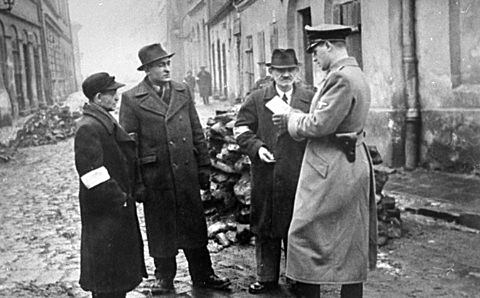AZ Judge Okays "Show Me Your Papers" Law
Posted on Thu Sep 06, 2012 at 03:14:33 PM EST
Tags: immigrants rights (all tags)

Photo credit: Archiwum Panstwowe w Krakowie
U.S. District Court Judge Susan Bolton has ruled that the provision in S.B. 1070, Arizona's on-hold immigration law allowing police officers to ask for proof of lawful presence in the U.S. during a valid traffic stop can go into effect. Police are expected to start enforcing it in about 10 days.
Judge Bolton has closed the door on facial attacks to the statute. The Supreme Court ruled last year that this part of the law is constitutional because it requires police to check the documentation without regard to race or ethnicity.
[More...]
The legal challenges to this section of the law aren't over, they just can't be made now. Once it goes into effect and victims start reporting profiling abuses, a challenge can be made that the enforcement of the law violates civil rights.
The Supreme Court struck down three other provisions of the law, such as the provision making it a misdemeanor not to carry documentation of lawful presence at all times, and a ban on undocumented immigrants soliciting work in public places. The Supreme Court opinion is here. It states:
As a general rule, it is not a crime for a removable alien to remain present in the United States. See INS v. Lopez, Mendoza, 468 U. S. 1032, 1038 (1984).
On the papers provision:
Section 2(B) of S. B. 1070 requires state officers to make a “reasonable attempt . . . to determine the immigration status” of any person they stop, detain, or arrest on some other legitimate basis if “reasonable suspicion exists that the person is an alien and is unlawfully present in the United States.” Ariz. Rev. Stat. Ann. §11–1051(B) (West 2012). The law also provides that “[a]ny person who is arrested shall have the person’s immigration status determined before the person is released.” Ibid. The accepted way to perform these status checks is to contact ICE,which maintains a database of immigration records.
Three limits are built into the state provision. First, a detainee is presumed not to be an alien unlawfully present in the United States if he or she provides a valid Arizona driver’s license or similar identification. Second, officers “may not consider race, color or national origin . . . except to the extent permitted by the United States [and] Arizona Constitution[s].” Ibid. Third, the provisions must be “implemented in a manner consistent with federal law regulating immigration, protecting the civil rights of all persons and respecting the privileges and immunities of United States citizens.”
The Supreme Court ruled it wasn't clear that enforcement of the papers provision "in fact conflicts with federal immigration law and its objectives." From the syllabus of the opinion:
It is not clear at this stage and on this record that §2(B), in practice, will require state officers to delay the release of detainees for no reason other than to verify their immigration status. This would raise constitutional concerns. And it would disrupt the federal framework to put state officers in the position of holding aliens in custody for possible unlawful presence without federal direction and supervision.
But §2(B) could be read to avoid these concerns. If the law only requires state officers to conduct a status check during the course of an authorized, lawful detention or after a detainee has been released, the provision would likely survive preemption —at least absent some showing that it has other consequences that are adverse to federal law and its objectives.
Without the benefit of a definitive interpretation from the state courts, it would be inappropriate to assume §2(B) will be construed in a way that conflicts with federal law....This opinion does not foreclose other preemption and constitutional challenges to the law as interpreted and applied after it goes into effect.
Judge Bolton yesterday did grant an injunction against the provision making it a crime to transport, shield, or harbor an undocumented person in Arizona.
From President Obama's statement on the Supreme Court ruling:
I remain concerned about the practical impact of the remaining provision of the Arizona law that requires local law enforcement officials to check the immigration status of anyone they even suspect to be here illegally. I agree with the Court that individuals cannot be detained solely to verify their immigration status. No American should ever live under a cloud of suspicion just because of what they look like. Going forward, we must ensure that Arizona law enforcement officials do not enforce this law in a manner that undermines the civil rights of Americans, as the Court’s decision recognizes.
Furthermore, we will continue to enforce our immigration laws by focusing on our most important priorities like border security and criminals who endanger our communities, and not, for example, students who earn their education – which is why the Department of Homeland Security announced earlier this month that it will lift the shadow of deportation from young people who were brought to the United States as children through no fault of their own.
Here is the ACLU's class action complaint against the show me your papers provision filed in 2010. The ACLU said today:
Although the court denied our request to block Section 2(b) from going into effect, the fight against SB1070 isn’t over by any means. We plan to ramp up our litigation efforts to seek justice on behalf of all victims of racial profiling and illegal detentions. And we will continue to send a strong message to policymakers in other states that it’s un-American to target people like Hugo simply because of the color of their skin.
| < Human Rights Report: Bush Admin. Used Waterboarding on Libyans in Afghanistan | Informants as Pawns in the War on Drugs > |



